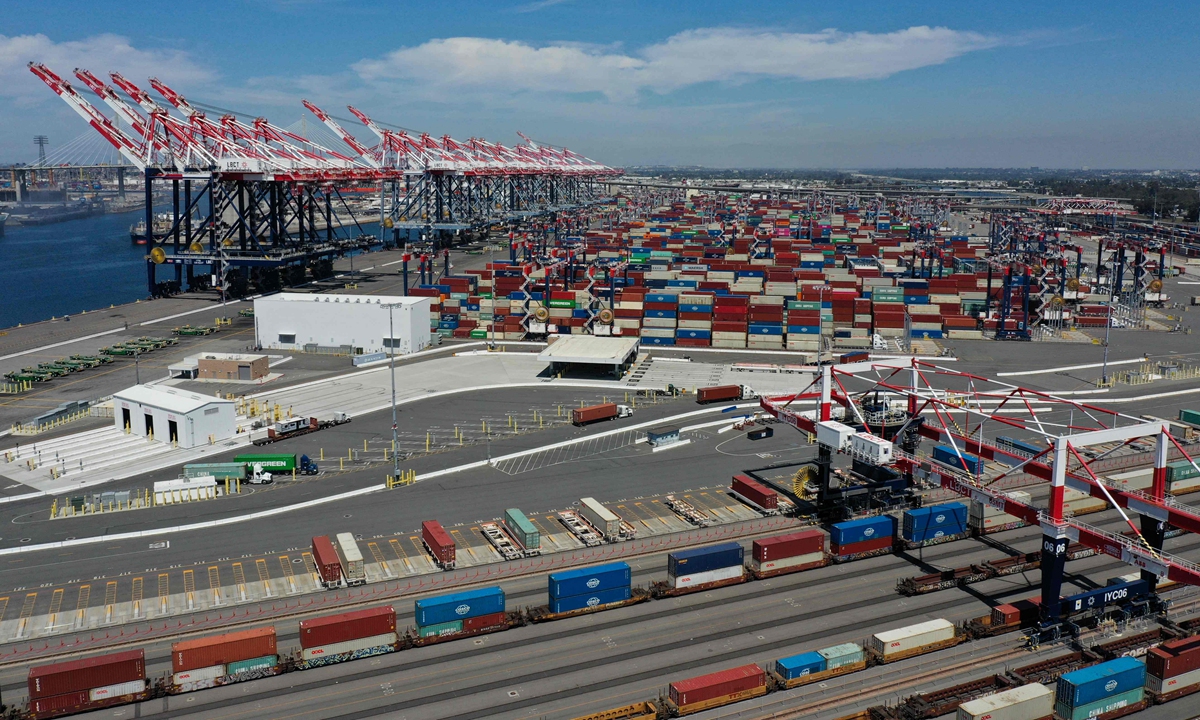
An aerial image shows cargo shipping containers and cranes as cargo containers sit stacked on freight trains at the Port of Long Beach in Long Beach, California on April 10, 2025. Photo: VCG
The US government has recently taken a risky step with its trade policy by imposing a new wave of tariffs on key global trading partners, under the pretext of "reciprocity." While many nations have expressed strong opposition, it has become urgent for them to diversify trade and seek sustained economic growth amid the growing uncertainty and disruption caused by US' erratic tariff policies.
Thanks to its stable economy and firm commitment, China has emerged as a critical anchor of certainty for the world in 2025. Strengthening institutional guarantees and expanding economic and trade cooperation with China will not only support the multilateral trading system but also drive sustainable growth for businesses worldwide.
Tariffs - costs of global supply chains - have risen significantly during Trump's term. Elevated tariffs have significantly increased international trade costs and uncertainties, undermining confidence in economic growth. Faced with various tariff threats from the US, Canada, Mexico, the EU and some other economies have adopted resolute retaliatory measures. As a result, the scope of new tariffs has extended, triggering a widespread chain reaction of tariff escalations, exacerbating global trade fragmentation and economic disparities.
In 2025, global GDP is projected to slow to 2.3 percent growth, the lowest since the COVID-19 pandemic, due to US' "reciprocal tariffs," according to a recent report from international financial services provider Allianz. The US will enter a mild recession, with a weak 0.8 percent growth in 2025, it said.
Trade diversificationThe escalation of US tariffs against its major trading partners will seriously hinder bilateral trade flows. Nations enjoying closer economic ties to the US, particularly the EU, Canada and Mexico, are likely to face greater challenges. To stabilize their economy, these countries should expedite efforts to diversify trade partnerships and reduce dependence on the US market.
Michael Schumann, chairman of the German Federal Association for Economic Development and Foreign Trade, urged Europe to pursue an independent economic strategy and resist passively accepting the fallout of US policy decisions, the Xinhua News Agency reported in February.
Schumann emphasized the importance of Europe in strengthening economic cooperation with China to uphold the openness and stability of the global trade system.
Whether the EU, or other countries and regions, including ASEAN, Africa, or Latin America, can all benefit from long-term trade cooperation with China. Stable and ever-expanding trade ties from trade to investment will provide all countries exposed to US tariffs - including the EU and Canada - valuable experiences and a reference point for pursuing sustainable economic growth.
Strengthening traditional trade partnerships while pioneering innovations in areas like green development, as well as deepening supply chain integration with China, will unlock sustainable economic momentum for nations worldwide.
China, Japan and South Korea held their first trilateral economic and trade ministers' meeting in five years in March, agreeing to accelerate negotiations on the trilateral free trade agreement, strengthen supply chain cooperation, and enhance regional cooperation, among other aspects. The strengthened cooperation between the three major economies in East Asia is not only a measure to deal with US trade pressure but also boosts economic diversification and reduces reliance on the US market.
Over the past few decades, China's economy has continued to grow despite various challenges. The economic resilience stems from its unwavering commitment to multilateral order and active international cooperation, its steadfast fulfilment of opening-up commitments, sound coordination between government and market mechanisms, and the indomitable spirit and innovative curiosity of Chinese entrepreneurs.
Regardless of the intensity of US tariffs, seasoned Chinese foreign trade enterprises have demonstrated the capability to adjust and respond rapidly. They serve as pilots and fresh troops in meeting global demand, advancing industrial upgrade and enabling efficient application of innovative technologies. Working with global partners committed to strengthening industrial and supply chains in collaboration with China, they will jointly create a shared future of more resilient, inclusive growth based on rules and mutual benefit.
The author is a senior research fellow at the Chinese Academy of International Trade and Economic Cooperation.




